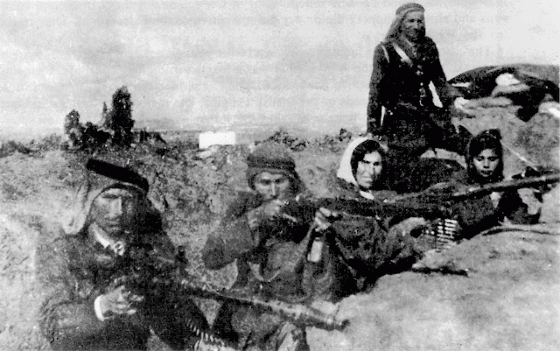I highly recommend Anglin’s book Orde Wingate: Unconventional Warrior for those of you who have an interest in learning about Counter-Insurgency Warfare and it’s timeless principles.-SF

“Orde Wingate’s experiences from World War Two offer lessons for 21st Century military planners, particularly in the areas of counter-insurgency, covert and special operations and proxy wars.”
By Dr. Simon Anglin
MAJOR GENERAL Orde Wingate was the most controversial British commander of the Second World War, and can still split opinion even 70 years after his death.
This is unsurprising: a man who ate six raw onions per day, ordered all his officers to eat at least one themselves and who conducted press conferences in the nude while scrubbing himself with a wire brush is bound to leave an impression. However, much of the controversy runs deeper than this, stemming from his performance as military commander particularly in the years leading up do his death at the age of 41 in a plane crash in Burma in 1944.
Controversy surrounds his role during Palestine Arab Uprising of 1936-1939, when Wingate, a captain on the Staff of General Headquarters in Haifa, was ordered to train Jewish policemen, in British-organized counterterrorist units known as the Special Night Squads.
Wingate, a passionate Zionist, politicized this mission, turning it into the backbone of a personal campaign for a Jewish state. He deployed his Night Squads in politically explosive pre-emptive raids and reprisals against Arab villages believed to be hiding insurgents. He also used ‘robust’ interrogation methods to extract intelligence from prisoners.

Yet he is best remembered in Britain for his command of the Long Range Penetration Groups in Japanese occupied Burma. These light infantry formations used ‘guerrilla’ methods. Supplied and supported by air, they conducted two major operations deep inside enemy territory: Operation Longcloth in 1943 and Operation Thursday in 1944.Despite this — or perhaps because of it — Wingate was summoned in late 1940 by General Sir Archibald Wavell, British commander-in-chief for the Middle East, to take over an operation organized by the MI(R) covert warfare branch of the British War Office aimed at escalating and steering guerrilla resistance in Italian occupied Ethiopia. Wingate succeeded far beyond MI(R)’s ambitions, raising and commanding ‘Gideon Force’, a purpose organized regular formation for operations deep inside hostile territory, which cooperated with local tribal irregulars in the Gojjam region of western Ethiopia to defeat an Italian force at least ten times its size. He also participated directly in restoring the Emperor Haile Selassie to the throne taken from him by the Italians five years before.
These Long Range Penetration Groups are better remembered as the Chindits, a propaganda name derived from Wingate’s mispronunciation of Chinthey, the stone griffin figures which guard Buddhist temples in Southeast Asia. As part lion, part dragon, the Chinthey seemed an appropriate symbol for an air-land force, and their mythical significance to the people of the region was not lost on Wingate.
Wingate’s experiences in Burma and elsewhere are still relevant to this day, particularly in the light of likely future missions for the armed forces of many western democracies. His views on special operations, covert warfare, command and morale, among other things, speak to 21st Century militaries.

Wingate, an ardent Zionist, trained Special Night Squads to combat Arab guerrillas (pictured here) during the 1936 Palestinian Uprising. (Image source: WikiCommons)
Wingate on Leadership
As a commander, Wingate embodied what could be described as the Sandhurst model of leadership — when a leader causes a group to perform a goal-related activity which the group would not have performed without the leader’s influence.
Moreover, in war, leaders also must think about their opponents’ likely goal-related activities and how best to thwart or disrupt them. An effective commander doesn’t just get his own soldiers to follow his will, but the enemy, too.
Indeed, Wingate was something of a pioneer of ‘effects-based operations’, a trendy buzzword for something that has actually been around for centuries. His first thought in any military scheme being the desired effect he wanted to have on the enemy. To the uninitiated this might seem ahead of its time, and while Wingate’s admirers claim he was a ‘military genius’, his papers suggest not so much a great original thinker than an astute cherry-picker and synthesizer of existing ideas who had no compunction about presenting them as his own.
However, where Wingate seems to have been original was in his view of what war and warfare actually were. And this brings us to his views on leadership. To Wingate, it was the hinge on which everything else swung. Because he saw war as a clash of cultures, dialectical and human-centred, people engaged in the fighting needed training, command and control and they also needed a degree of physical and mental conditioning.
A great deal of his approach to training was aimed not just at convincing the people under his command that they were actually capable of doing things they had previously thought impossible, but that they were better at it than others, especially the enemy. Subsequently, they would venture forth and demonstrate their prowess, not only to the enemy and third parties but to themselves as well.
Read the Remainder at MilitaryHistoryNow
